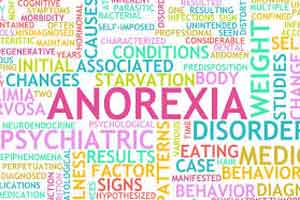- Home
- Editorial
- News
- Practice Guidelines
- Anesthesiology Guidelines
- Cancer Guidelines
- Cardiac Sciences Guidelines
- Critical Care Guidelines
- Dentistry Guidelines
- Dermatology Guidelines
- Diabetes and Endo Guidelines
- Diagnostics Guidelines
- ENT Guidelines
- Featured Practice Guidelines
- Gastroenterology Guidelines
- Geriatrics Guidelines
- Medicine Guidelines
- Nephrology Guidelines
- Neurosciences Guidelines
- Obs and Gynae Guidelines
- Ophthalmology Guidelines
- Orthopaedics Guidelines
- Paediatrics Guidelines
- Psychiatry Guidelines
- Pulmonology Guidelines
- Radiology Guidelines
- Surgery Guidelines
- Urology Guidelines
Anorexia Nervosa can be controlled through Brain Stimulation

London : Just one session of a non-invasive brain stimulation technique can reduce core symptoms of anorexia nervosa, including the urge to restrict food intake and feeling fat, says a study.
The researchers assessed whether repetitive transcranial stimulation (rTMS), already an approved treatment for depression, is also effective in reducing symptoms of anorexia.
Up to 20 percent of people with anorexia die prematurely from the disorder and treatments in adults are moderately effective, with only 20-30 per cent of people recovering from the best
"With rTMS we targeted the dorsolateral prefrontal cortex, an area of the brain thought to be involved in some of the self-regulation difficulties associated with anorexia. This technique alters neural activity by delivering magnetic pulses to specific regions of the brain, which feels like a gentle tapping sensation on the side of the head," said first author of the study Jessica McClelland from King's College London.
"We found that one session of rTMS reduced the urge to restrict food intake, levels of feeling full and levels of feeling fat, as well as encouraging more prudent decision-making. Taken together, these findings suggest that brain stimulation may reduce symptoms of anorexia by improving cognitive control over compulsive features of the disorder," McClelland noted.
The findings were published in the journal PLOS ONE.
In the study, 49 people completed food exposure and decision-making tasks, both before and after a session of either real or placebo rTMS. Symptoms of anorexia were measured immediately prior to and following rTMS, as well as 20 minutes and 24 hours after the session.
Compared to the placebo group, they found that participants who had real rTMS showed a tendency for more prudent decision-making.

Disclaimer: This site is primarily intended for healthcare professionals. Any content/information on this website does not replace the advice of medical and/or health professionals and should not be construed as medical/diagnostic advice/endorsement or prescription. Use of this site is subject to our terms of use, privacy policy, advertisement policy. © 2020 Minerva Medical Treatment Pvt Ltd